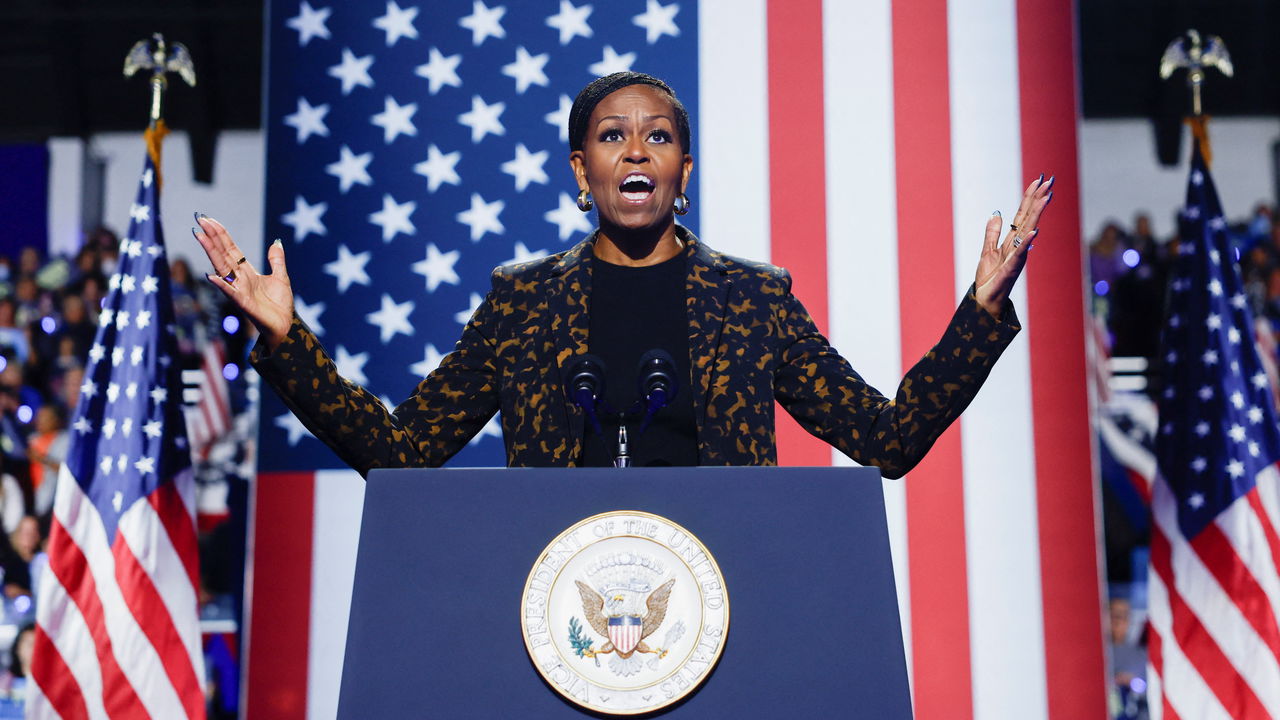James Bennet, our Lexington columnist, considers Michelle Obama’s contributions to the last few days of the Democratic campaign
As you might expect, I’ve listened to many campaign speeches this year. To me, the most interesting of the lot was the one Michelle Obama delivered on Saturday in Kalamazoo, Michigan, where she introduced Kamala Harris before about 5,000 people packed into a small arena. Besides her speech at the Democratic convention, it was her only appearance on the campaign trail. She made the case against Donald Trump with glacial contempt. But the heart of the speech was an account of the importance of reproductive rights that framed the matter in terms of women’s health more broadly and even of their place in the family and the nation’s politics.
Mrs Obama said that, rather than learning to talk about their reproductive health, women and girls had been “taught instead to feel shame and to hide how our bodies work”. As the crowd fell silent, rapt, she went on, in concrete and even graphic terms I’ve never heard a politician use, to speak first about the experience of girls in puberty. And then “at the other end of the reproductive timeline”, she continued, “too many women my age have no idea what’s going on with our bodies as we battle through menopause and debilitating hot flashes and depression.” Would you have expected that to be an applause line? The crowd went wild, cheering and clapping: I suspect this is what people must mean when they talk about “feeling seen”.
Mrs Obama may have been relating to the other women in the room, and those who might watch a video later, but she was also trying to reach men. “See, fellows,” she went on, “most of us women, we suck up our pain and we deal with it alone.” Mr Trump has been holding himself out on the campaign trail as the protector of women, “whether the women like it or not”, as he put it in Wisconsin on Thursday. Mrs Obama was urging women to protect themselves, but also calling on men to stick up for them, in their own interest, too. She conjured an image of “your wife shivering and bleeding on the operating room table” after a botched delivery and warned, “You will be the one pleading for somebody, anybody, to do something.”
The contrast could not have been more stark with Mr Trump’s event at Madison Square Garden the following evening. Like all his events it had a masculine vibe, in part because most of the many speakers were men; in part because one of those men was a professional wrestler, another runs an ultimate fighting league and a third was Elon Musk; and in part because the humour was directed at people who would find it funny to hear Ms Harris’s aides called “pimp handlers”. There were plenty of women in the audience who were laughing, too.
Pollsters may once again have underestimated Mr Trump’s support, and he may have this election in the bag. On the other hand, this is the first campaign he has run since the Supreme Court struck down Roe v Wade, as he wanted it to, and no one can be certain how motivating that issue will prove. Regardless of who wins, the political movement to restore reproductive rights, as I mention in Lexington this week, is changing the country and its politics in profound ways, and I think the combination with Ms Harris’s candidacy probably marks a permanent shift in expectations about women’s rightful roles in public life. Mr Trump has made so much that was once abnormal in politics seem normal. In this, more hopeful way, Ms Harris has, too.

 Accounting1 week ago
Accounting1 week ago
 Accounting1 week ago
Accounting1 week ago
 Personal Finance1 week ago
Personal Finance1 week ago
 Finance1 week ago
Finance1 week ago
 Economics1 week ago
Economics1 week ago
 Economics1 week ago
Economics1 week ago
 Economics1 week ago
Economics1 week ago
 Personal Finance1 week ago
Personal Finance1 week ago










